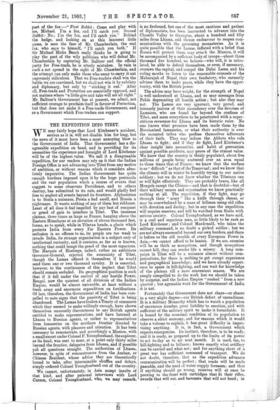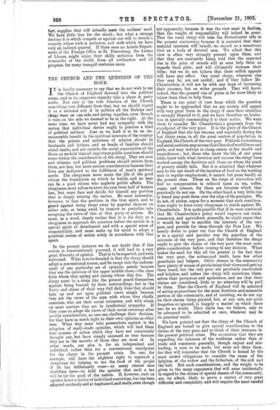THE EXPEDITION INTO TIBET.
WE may fairly hope that Lord Kitchener's accident, serious as it is, will not disable him for long, but the news of it must have been a most annoying blow to the Government of India. That Government has a dis- agreeable expedition on hand, and in providing for its necessities the experience and foresight of Lord Kitchener will be of the highest value. We call it a disagreeable expedition, for our readers may rely on it that the Indian Foreign Office is not advancing into Tibet from any motive of ambition, or without reasons which it considers abso- lutely imperative. The Indian Government has quite enough burdens imposed upon it by the huge peninsula and the vast population which a course of events that suggest to some observers Providence, and to others destiny, has submitted to its rule, and, would gladly feel free to neglect all events beyond its frontiers. Afghanistan is to Simla a nuisance, Persia a bad smell, and Russia a nightmare. It wants nothing of any of them but riddance. Least of all does it feel impelled by any lust of conquest or greed of gain to interfere in Tibet. The immense plateau, three times as large as France, hanging above the Eastern Himalayas at an elevation of eleven thousand feet, forms, so to speak, while in Tibetan hands, a glacis which protects India from every Far Eastern Power. Its seclusion is no offence to us, its people are too weak to invade India, its strange organisation is a subject only of intellectual curiosity, and it contains, so far as is known, nothing that could tempt the greed of the most rapacious. The Marquis of Hastings, indeed, rather an ambitious Governor-General, rejected the suzerainty of Tibet, though the Lamas offered it themselves if he would send them one or two thousand cavalry. It is essential, however, to the continuance of this neglect that Tibet should remain secluded. Its geographical position is such that if it fell under the control of any hostile Power, Bengal, now the quietest of all divisions of the Indian Empire, would be almost untenable, at least without a fresh army and enormous expenditure on fortifications. Of late, therefore, the Government of India has been com- pelled to note signs that the passivity of Tibet is being abandoned. The Lamas have broken a Treaty of commerce which they seemed to make willingly enough, have shown themselves unusually discourteous to any British agents entitled to make representations, and have listened at Lhassa to Russian agents, or rather to representatives from lamaseries on the northern frontier directed by Russian agents, with pleasure and attention. It has been necessary to remonstrate, and accordingly a Mission, with a small escort under Colonel F. Younghusband, the explorer, as its head, was sent to meet, at a. point only thirty miles beyond the frontier, delegates from Lhassa, and if possible pit all questions straight The authorities of Lhassa, however, in spite of remonstrances from the Amban, or Chinese Resident, whose advice they are theoretically bound to take, after interminable shuffles and delays, simply ordered Colonel Younghusband out of the country. We cannot, unfortunately, in Asia accept insults of that kind, and after personal interviews with Lord Curzon, Colonel Younghusband. who, we may remark. is no firebrand, but one of the most cautious and patient of diplomatists, has been instructed to advance into the Chumbi Valley to Gvangtse, about a hundred and fifty miles from Lhassa, and thence endeavour to reopen com- munications with the governing monasteries. As it is quite possible that the Lamas, inflated with a belief that Russia will protect them, may attack the Mission, it will be accompanied by a sufficient body of troops—about three thousand five hundred, we believe—who will, it is calcu- lated, be able to defend themselves, or mil, if necessary, overawe the capital, and compel the Dalai Lama and his ruling monks to listen to the reasonable counsels of the Maharajah of Nepal, their own feudatory, who earnestly advises them to make peace, while they have the oppor- tunity, with the British power.
The advice may have weight, for the strength of Nepal is well understood at Lhassa, and so may messages from Pekin deprecating all hostile action ; but also they may not. The Lamas are very ignorant, very proud, and. intensely jealous of their ascendency over the devotees of Lamaism, who are found far beyond the confines of Tibet, and seem everywhere to be penetrated with a super- stitious reverence for Lhassa and its hieratic ruler. No one knows what promises have been made them by the Russianised lamaseries, or what their authority is over the mounted tribes who profess themselves adherents of their faith. They may induce the Abbots who rule Lhassa to fight ; and if they do fight, Lord Kitchener's clear insight into necessities, and habit of prevention against possible accidents, may prove of the utmost value. We know that the country is thinly populated, about five millions of people being scattered over an area equal to three times that of France ; we know that the surface is as" difficult" as that of the Transvaal ; and we know that the climate will in winter be horribly trying to our native soldiery ; but we do not know whether the Tibetans can or will fight effectively. They are probably brave, like all Mongols except the Chinese—and that is doubtful—but of their military means and organisation we know practically nothing at all. The expedition, if they fight, may go through their " army " like a knife through cheese, or may be overwhelmed by a mass of hillmen using old rifles with devotion and daring ; but in any case the expedition will require reserves, and will be watched from Simla with serious anxiety. Colonel Younghusband, as we have said, is a cool and sagacious man, as little likely to be rash as Lord Kitchener ; and Colonel Macdonald, who takes the military command, is no doubt a picked soldier ; but we are not always successful beyond our own borders, and there is before us the old trouble of every European Power in Asia,—we cannot afford to be beaten. If we are, enemies will be as thick as mosquitoes, and though mosquitoes cannot kill, they can render life a misery. A long cam- paign in Tibet will be a nuisance almost without com- pensations, for there is nothing to get except experience and geographical knowledge ; and we have already experi- ence to spare in hill-fighting, and can wait for knowledge of the plateau till a more convenient season. We are simply compelled to do the work lest we should be taken by surprise, and the Indian Empire " rushed " from a new quarter ; but agreeable work for the Government of India it is not.
Fortunately that Government does not share—or shares in a very slight degree—our British defect of unreadiness. It is a military Monarchy which has to watch a population of enormous number, great liability to emotion, and with sufficient of the military spirit to make it formidable. It is bound by the economic condition of its population to observe a strict economy, and for reasons which it would take a volume to explain, it has great difficulty in impro- vising anything. It is, in fact, a Government which expects emergencies. Its instinct, therefore, is to be ready, and it is ready, as prepared up to the limits of its power to act to-day as to act next month. It is used, too, to hill-fighting and to hillmen ; knows exactly what artillery can be carried and what not ; and for anything short of a great war has sufficient command of transport. We do not doubt, therefore, that as the expedition advances communication will be perfect ; that roads will be made passable, and the need of water supply foreseen; and that if anything should go wrong, reserves will at once be pouring to the front with cartridges that fit their rifles, swords that will cut. and bayonets that will not bend ; in fait, Supplies that will actually meet the soldiers' need. We have little fear for the result ; but what a strange destiny it is which compels us against our will to invade a country whose wish is seclusion, and with which we have only an indirect quarrel. If there were no Asiatic Depart- ment of the Foreign Office in St. Petersburg, the Lamas of Lhassa might enjoy their chilly seclusion from the remainder of the world, from all civilisation and all progress, for many tranquil centuries more.



























































 Previous page
Previous page